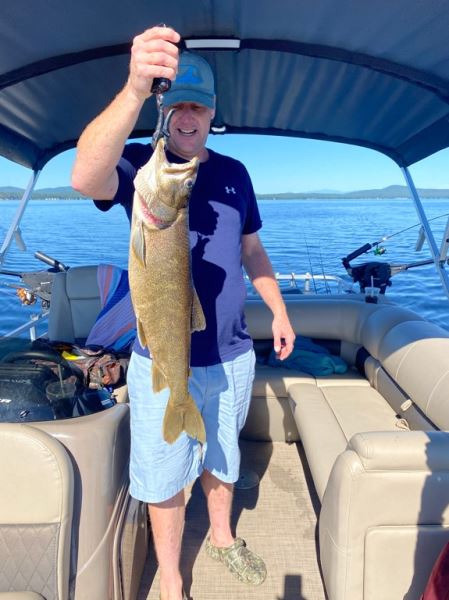.JPG_600.jpg) You might be wondering about pond fishing vs lake fishing. What are the main differences between fishing in a pond and fishing in a lake? While both are bodies of water where you can catch freshwater fish, you often need to apply different techniques and strategies when fishing in a lake versus fishing in a pond.
You might be wondering about pond fishing vs lake fishing. What are the main differences between fishing in a pond and fishing in a lake? While both are bodies of water where you can catch freshwater fish, you often need to apply different techniques and strategies when fishing in a lake versus fishing in a pond.
Generally speaking, lakes are bodies of water that are larger (over 20 acres) and deeper than ponds. Ponds are smaller, shallower bodies of water that tend to offer easier access for bank fishing. Learn about four of the differences between pond and lake fishing so you can choose the type of fishing spot that makes sense for you.
Differences Between Pond and Lake Fishing
When considering the differences between pond vs lake angling and the best way to fish in each type of water body, there are several factors involved. This includes the time of year, water temperature, type of baitfish or forage, water depth, bottom composition, and types of structure in the pond or lake.
1. The best pond fishing techniques are those that work well in shallow water. This would include soft plastic creature baits (worms, crawfish, lizards), topwater frogs, lipless crankbaits, soft plastic jerkbaits, and spinnerbaits. Strategies for successful lake fishing should include deep water presentations such as deep diving crankbaits, drop shot rigs, football jigs, and bucktail jigs.
.jpg_600.jpg) 2. In order to take advantage of the best lake fishing opportunities, you should have a boat with a fish finder that includes a water temperature and depth gauge. Since lakes are generally deeper and have a wider range of depths, water temperatures in a lake can vary much more than they would in a pond. Lakes also go through more pronounced seasonal water temperature changes. Largemouth bass, for example, will tend to be most active in 65 to 80-degree water temperatures.
2. In order to take advantage of the best lake fishing opportunities, you should have a boat with a fish finder that includes a water temperature and depth gauge. Since lakes are generally deeper and have a wider range of depths, water temperatures in a lake can vary much more than they would in a pond. Lakes also go through more pronounced seasonal water temperature changes. Largemouth bass, for example, will tend to be most active in 65 to 80-degree water temperatures.
 3. The structure and ecosystems will be different in a pond versus a lake. Since ponds are shallower than lakes, pond ecosystems support more rooted plants and pond weeds. Fish will use the vegetation in a pond to hide from predators and ambush prey, which means areas of thick vegetation are often the best spots to fish. Since lakes are deeper than ponds, sunlight may not reach the bottom in the deepest parts of some lakes. This means there would be less vegetation in a deep lake than there would be in a shallow pond. Prime fish habitat in a deep lake would more likely be structure like rock piles, downed tree branches, bridges, points, and depth transitions.
3. The structure and ecosystems will be different in a pond versus a lake. Since ponds are shallower than lakes, pond ecosystems support more rooted plants and pond weeds. Fish will use the vegetation in a pond to hide from predators and ambush prey, which means areas of thick vegetation are often the best spots to fish. Since lakes are deeper than ponds, sunlight may not reach the bottom in the deepest parts of some lakes. This means there would be less vegetation in a deep lake than there would be in a shallow pond. Prime fish habitat in a deep lake would more likely be structure like rock piles, downed tree branches, bridges, points, and depth transitions.
4. When choosing between pond and lake fishing, think about the ease of access and your level of fishing experience. If you don’t have a boat or want to take someone fishing for the first time, a pond can be one of the best places to fish from the bank. Ponds are also great places to fish if you have limited time and just want to fish for an hour or two.
What’s the bottom line? While there are different approaches to take when pond fishing vs lake fishing, focus on figuring out where the structure and food sources are in each type of waterway – from there you’ll find the fish.

